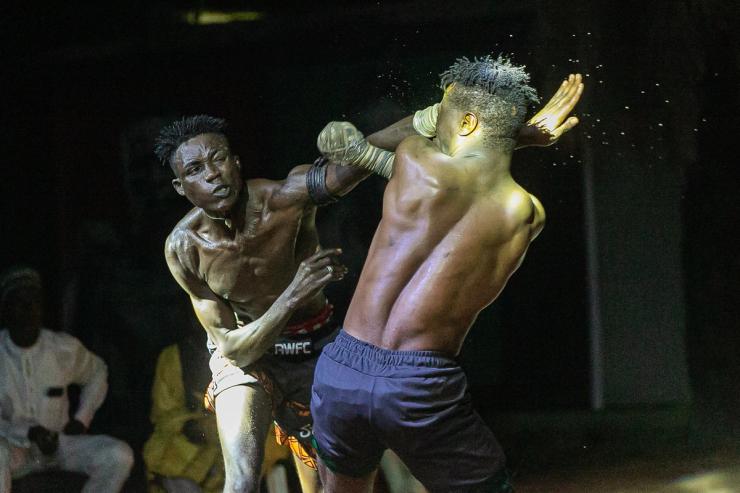The Scoop
Nigerian traditional boxing is set to get a boost on the global stage with backing from an African private investment firm and a Hollywood producer.
Silverbacks Holdings, a firm domiciled in Mauritius, invested late last year in Nigeria-based sports venture African Warriors Fighting Championship whose major product is Dambe, a centuries-old boxing sport indigenous to the country’s northern region. Sanford R. Climan, a former Universal Studios executive whose work included producing Martin Scorsese’s The Aviator, is joining Silverbacks as an advisory board member and will personally invest in the wrestling outfit, the investment firm said.
The move comes weeks after AWFC announced a partnership with UK-based sports streaming service DAZN to bring Dambe to a global audience.
Ibrahim Sagna, who heads Silverbacks, said AWFC’s appeal lay in its ability to reach a global audience who were familiar with other combat sports. “It is a sport that’s already commanding a massive appetite — UFC [Ultimate Fighting Championship], PFL [Professional Fighters League] — you see a trend. You check the valuation of those companies, there’s already a massive demand.”
“If you think about human nature in its essence, what were the Roman arenas? There’s always been an appetite for this. It’s just that now it’s commercialized at scale,” said Sagna.
AWFC founder Maxwell Kalu said the fighting league, which has around 300 fighters and has previously been sponsored by online betting company Stake, had amassed 900 million views across social media and partner platforms since its launch in 2019. He added that the largest audiences were in Nigeria, the US, and Brazil.
Know More
Combat sports are popular across much of West Africa. Traditional wrestling is popular in Senegal. The sport, known as Laamb, has attracted corporate sponsors in the last decade.
An estimated 300 million people — a large proportion of whom are young men — reportedly consider themselves fans of mixed martial arts. And combat sports have become multibillion dollar franchises. In 2023, World Wrestling Entertainment Inc (WWE) combined with UFC to form a publicly listed entertainment group valued at around $21 billion.
Cameroonian mixed martial arts and boxing star Francis Ngannou last year announced that he had taken up a leading role in a new African MMA league backed by the US-based fight promoter Professional Fighters League. The African MMA series is set to begin this year and includes a deal with French media giant Canal+ which, in addition to airing fights, aims to broadcast the sport to 8 million homes.
Silverbacks was an early investor in Nigerian fintech unicorn Flutterwave, as well as in Africa-focused remittance startup LemFi. Over the last five years, partial exits from its fintech investments have yielded an average 11x return on cash invested, enabling Silverbacks to return profits to investors while redeploying some of the gains into its sports and entertainment portfolio, said Sagna.
Alexis’s view
Sport is visceral. It provokes delight and fandom, transcending language and defying distance. All a person needs is a screen to follow the action. That means it can scale up. The investment by Silverbacks Holdings is a bet on the global appeal of an African sports franchise that can be streamed to an audience of millions who don’t know the ancient roots of Dambe but are familiar with combat sports.
This points to the potential for sports leagues across the continent to attract funding, grow, and reach an audience beyond a country’s borders. The sports could be variations of globally recognized disciplines, or local leagues in the way that European football is followed by fans worldwide. We’re already seeing the rise of basketball across the continent and other sports franchises are likely to follow.
I spoke to several investors at the Africa Private Capital summit in Lagos who see untapped opportunities in African sports. They see it as a way to export content relatively cheaply, with the potential to generate broadcasting partnerships, sponsorship deals, and related merchandise such as player jerseys. And if the sporting league is an African country with a large population, there’s the added bonus of increasing the domestic audience. There will be challenges, of course, ranging from poorly run local sports to a lack of infrastructure such as the stadia needed to ensure that a sport generates the gate fees required to make sporting events sustainable at a local level. But the potential is real.
Room for Disagreement
Africa has a large base of sports fans but monetizing their attention remains a challenge for creators, said Uel Migan-Gandonou, partner at 10k Sports and Wellness Fund. “Everyone is passionate about following sports and that is really clear, but the issue we have been having is making sure that we turn fans into customers,” he said.
But monetization drives must also be sensitive to the low levels of disposable income on the continent, Migan-Gandonou said. “We need to think about smart ways to offer affordable subscriptions.”
The View From Washington DC
Gbemisola Abudu, former head of the National Basketball Association’s operations in Nigeria, said developing infrastructure is a foundational need for growing the business of sports in Africa. “Without infrastructure, the leagues have no place to play,” Abudu, now a fellow at the Atlantic Council, a think tank in Washington DC, said. She cited Nigeria’s inability to host a conference of the Basketball Africa League — a competition organized by the NBA — due to the absence of a befitting arena. “When you have a place where everyone can play, it forces the [local] league to be more professionalized.”
Notable
- Mixed martial arts looks set to take off in Africa, in part because it incorporates traditional fighting styles that are familiar to people across the continent, according to African Business.

